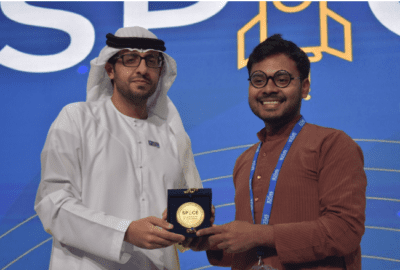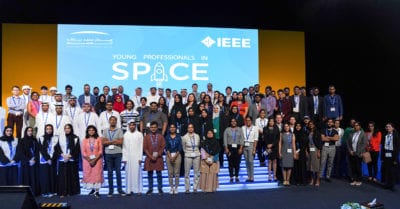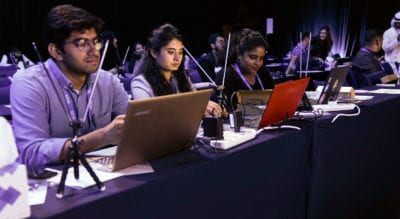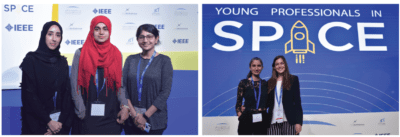Young Professionals in Space: Transformation through Democratization
Article by Suresh Venkatesh, Laura González Llamazares, and Saeed Al Mansoori
Rapid innovations in space technology require smart and immediate adaptation. This can be achieved by harnessing and grooming the young talents of today who will be the stakeholders of tomorrow. Young Professionals (YP) in Space, is a technical program conceived in the year 2016 with a dream of achieving this exact goal. This article highlights and recaps some of the success stories of this program, including the recently held YP event in Dubai, UAE, during November 2019.
Introduction
Traditionally, satellites and related space technologies mainly found their application in remote sensing, security, and direct-to-home broadcast services. With the burgeoning quest for high-speed data access, high-tech conglomerates have started to look up to the skies. The main players in space technology like SpaceX, Amazon, and OneWeb are investing heavily on space internet infrastructure and megaconstellations consisting of both Low Earth Orbit (LEO) and Medium Earth Orbit (MEO) satellites [1]. This potential trillion dollar market invariably requires innovations from varied aspects of science and engineering fields namely: chemical sciences for efficient rocket fuels, electrical engineering for modern communication systems, mechanical/aerospace engineering for novel propulsion systems, and so on. To understand and meet these challenges, YP in space was conceived by Dr. Tushar Sharma in 2016 (shown in Fig.1). The main motto of this program is to bring the world renowned experts from different fields of space technology and young professionals from all over the world under one umbrella [2]. These experts share their experiences and train the young professionals. YP in Space has completed three successful events in Bangalore (India 2017), Barcelona (Spain 2018), and Dubai (UAE 2019) so far. Until few years back, the space sector was perceived to be extremely closely knit and dominated by a few countries. However, some of the innovations and breakthroughs are currently being led by young professionals from different nationalities including from developing countries. This is evident in the kind of startups that are spawning in this area. This in turn has led to the opening up and democratization of the space sector.

Fig. 1. Tushar Sharma (right), the founder and chair of YP in Space being felicitated by Eng. Saeed Al Mansoori (left) from Mohammed Bin Rashid Space Centre at the Dubai 2019 YP event.

Fig.2. Dubai, UAE-2019 event
Hands-On-Training For Students
Another integral part of the YP in Space events are the hands-on-training sessions for students and young professionals. At the Spain event in association with Tripoli Spain (Rocketry Assocation Inc.) and Universitat Politècnica de Catalunya (UPC, Spain) Cansat launch was arranged. Here students learnt about spacecraft subsystem design and launched Cansats to an altitude of 700 m [2]. This initiative was very well appreciated by the student community. At the Dubai event, session on Software-Defined-Radios (SDRs) was arranged. In this session we had a total of 29 registered teams (each team with approximately 2 to 3 students). Training included lectures on basic analog/digital communication techniques and hands-on MATLAB programming of SDR kits. With wide use of Cubesats in universities and research institutes all over the world, many universities are including Cubesat design and space mission projects as a part of their graduate course curriculum. These courses are usually inter-departmental bringing together the knowledge base diverse student groups. Such hands-on training sessions will help to promote such initiative which will ultimately benefit students interested in space technology.

Fig. 3. Students and young professionals during the hands-on training sessions on software-defined-radios (SDRs) at YP in Space Dubai event.
Women in Space Technology
YP in Space initiative strives to increase women participation in its events. At the Dubai 2019 event we had a record number of women participation. Total women participants were 216 out of 461 total participants. The Dubai event technical committee chair was led by Eng. Meera Rashid Al Shamsi, who is the Head of Remote Sensing Applications Unit at Mohammed Bin Rashid Space Centre (MBRSC). Laura González Llamazares participated in the YP in Space 2018 Spain event as a graduate student. Today, she is the co-founder of a space start-up company called Radian Systems (see Fig.4)
These success stories not only motivates us but also helps us to encourage new upcoming women entrepreneurs and young professionals in this domain. The event also offered 27 travel grants worth 500 USD each to young professionals from 13 different countries. These travel grants were highly competitive and had received 251 total applicants. In the near future we plan to offer more of such travel grants.

Fig. 4. Eng. Meera Rashid Al Shamsi (leftmost) with other young professionals at the YP Dubai event (Left photograph). Eng. Meera is the Head of Remote Sensing Applications Unit at Mohammed Bin Rashid Space Centre (MBRSC). Sara Barros (left) and Laura González Llamazares (right) at the YP Dubai event (Right photograph). Sara is Advanced Development Engineer at Thales and Laura is an entrepreneur and is the co-founder of Radian Systems. Encouraging women participation is also one of the goals of YP in Space initiative.
Startups In Space and Technology
YP in Space also provides a networking platforms for star- tups in space sector. This includes technical presentations and booth spaces to showcase their technology. The start-up space was dominated by interesting companies at the Dubai event. Open Comos is a company based out of United Kingdom and is trying make space technology accessible to all. They their costumers to define their space missions including booking of launches, allocation of frequency channels and contract insurances. They also assemble and test the satellites prior to the launch. Open Cosmos was represented by Daniel Sors Raurell who is the Head of Customer Success. Precious Payload is a friendly digital service for teams planning to launch their satellite. They guide their customers through all the steps required to get your payload to orbit so that the customers can concentrate on their mission goal instead of wasting yourself on routine, paperwork, and tasks for suppliers. This company was represented by Andrey Maksimov who is the CEO and co-founder of Precious Payload. Radian Systems is another startup based out of Spain. This company is trying to provide thermal engineering solutions for space missions to its costumers. This company was represented by Laura González Llamazares who is the co- founder and Chief Marketing Officer of Radian Systems. Lastly, Skyroot Aerospace is a company based out of India trying to revolutionize transportation systems by making it more affordable and low cost. This company was repre- sented by Pawan Chandana, who is the co-founder and CEO of Skyroot Aerospace. Overall, these start-up companies are trying to solve unique and interesting problems in space sector.
Conclusion
In conclusion, YP in space has completed three successful years and looks forward to many more years. Organizers would like to thank IEEE community and the associated societies for their overwhelming support.
Acknowledgement
Authors would like to thank Eng. Meera Rashid Al Shamsi, Mohammed Bin Rashid Space Centre (MBRSC) for providing some of the metrics. Some of the photographs used in the article were reproduced from the social media Facebook page of Young Professionals in Space. Authors would also like to acknowledge the funding support from IEEE Young Professionals, IEEE Geoscience and Remote Sensing (GRSS) Society, IEEE Systems, Man, and Cybernetics (SMC) Society, IEEE Microwave Theory and Techniques Society (MTTS), IEEE Antennas and Propagation Society (APS), and IEEE Aerospace and Electronic Systems Society (AESS).
Disclosure
L. G. Llamazares is a co-founder of Radian Systems, which is commercializing agile thermal analysis solutions for satellites and payloads.
References
- CNBC, “An investor’s guide to space, Wall Street’s next trillion- dollar industry,” Accessed on: Nov.10, 2019. [Online]. Available: https://www.cnbc.com/2019/11/09/how-to-invest-in-space-companies- complete-guide-to-rockets-satellites-and-more.html
- [2] IEEE Young Professionals, “Beyond the Horizon: Young Professionals in Space 2018,” Accessed on: Nov.10, 2019. [Online]. Available: https://yp.ieee.org/beyond-the-horizon-young-professionals-in-space- 2018/
More about Authors:
Suresh Venkatesh is currently a Postdoctoral Researcher at Integrated Micro- systems Research Lab, Electrical Engineering Dept., Princeton University. He received his PhD in Electrical Computer Engineering from University of Utah in 2017 under the guidance of Prof. David Schurig. He received his M.S in Electrical Computer Engineering from North Carolina State University in 2010. His PhD dissertation received the ECE Outstanding Dissertation Award, 2016. He was also a Research Project Assistant at Raman Research Institute, Bangalore during 2007-08, where he worked on 10.4 m millimeter-wave radio telescope. His research interests are in electromagnetics, metamaterials, antenna design, and transformation optics design.
Laura González Llamazares graduated as Aerospace Engineer from Uni- versity of León, Spain, with a year at University of New South Wales, Sydney, Australia. As an undergraduate, she founded and led a maker society with more than 60 members and several engineering collaborative projects. Passionate about space, she has recently finished her MSc thesis at University Carlos III of Madrid in collaboration with SENER Aerospace. She is currently working as Systems Engineer for two ESA science missions at Spain’s National Institute of Aerospace Technology (INTA). She is the CMO and cofounder of Radian Systems, a thermal analysis start-up for space.
Saeed Al Mansoori is the head of the Applications Development and Analysis Section (ADAS) at Mohammed Bin Rashid Space Center (MBRSC). He has received B.Sc. degree in Communication Engineering from Khalifa University of Science, Technology and Research (KUSTAR), Sharjah, UAE in 2010 and the M.Sc. degree in Electrical Engineering from American University of Sharjah (AUS) in 2016. Saeed’s research interests are in the area of image processing (super-resolution, watermarking, object detection and image classification). He is the member of the international society of optics and photonics and one of the program committee in High-Performance Computing in Remote Sensing since 2012.